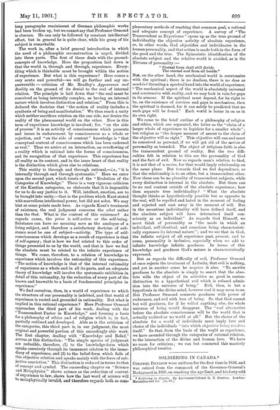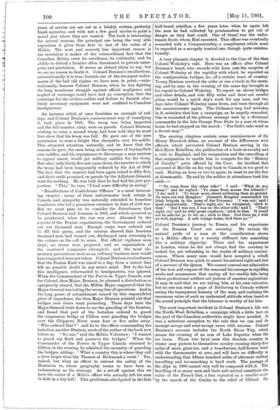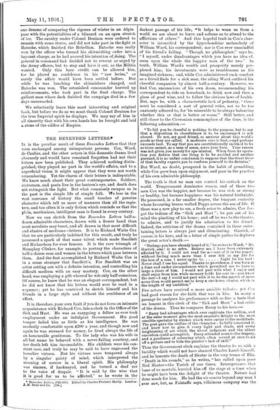SOLDIERING IN CANADA.*
COLONEL DENISON wore uniform for the first time in 1856, and was retired from the command of the Governor-General's Bodyguard in 1898, on reaching the age limit, and his forty odd.
• doldiarind in Canada. Ey LieratenantrColonel G. T. Denison. London; facntinan and Co. [Ss. 61.]
years of service are set out in a briskly written, perfectly frank narrative, and with not a few good stories to point a moral just where they are wanted. The book is interesting for several reasons, the principal one being the very able exposition it gives from first to last of the value of a Militia. The next and scarcely less important reason is the revelation it makes of the extraordinary fact that the Canadian Militia owes its excellence, its continuity, and its ability to defend a frontier often threatened, to private enter- prise and patriotism. It seems an absurd thing to say, but we see no reason to doubt it. Colonel Denison's recollections, unintentionally it is true, furnish one of the strongest indict- ments of the bad old regime we have seen in print—unin- tentionally, because Colonel Denison, when he was fighting the long wearisome struggle against official negligence and neglect of warnings, could have had no conception that the contempt for the civilian soldier and failure to furnish abso- lutely necessary equipment were not confined to Canadian headquarters.
An instance which at once furnishes an example of red- tape, and Colonel Denison's common-sense way of remedying it, took place in 1865. The troop was being inspected and the full number, sixty, were on parade. Colonel Denison, wishing to raise a second troop, had been told that he must first show that his troop was full. He gave one of the men permission to wear a bright blue sheepskin over his saddle. This attracted attention, naturally, and he knew that the reasons he gave, the men being at the expense of buying their own saddles, and his repugnance to discourage a man anxious to appear smart, would get military saddles for his troop. But, alas ! only thirty-five sets came down, the number to which the troop had been temporarily reduced by the Act of 1859. The fact that the number had been again raised to fifty-five, and their outfit promised on parade by the Adjutant-General, went for nothing. He was told that he had had his just pro- portion. "This," he says, "I had some difficulty in seeing."
"Recollections of Confederate Officers" is a most interest- ing chapter : many of these unfortunates took refuge in Canada. and sympathy was naturally extended to homeless wanderers who led a precarious existence in time of civil war- But we must pass on to consider the disturbances that Colonel Denison had foreseen in 1861, and which occurred as be prophesied, when the war was over. Alarmed by the reports of the Fenian organisation, the Government ordered out ten thousand men. Enough corps were ordered out to fill this quota, and the returns showed that fourteen thousand men had turned out, discharged men returning to the colours on the call to arms. But official vigilance soon slept ; no stores were prepared, and no organisation of the scattered companies attempted; and the most ele- mentary precautions such as an ordinary business man would have suggested were not taken. Colonel Denison received news that the Fenian Raid was timed to a day, from a source that left no possible doubt in any man's mind. But to the last this intelligence, reforwarded to headquarters, was ignored. When the Commandant of the Forces in Upper Canada sent for Colonel, then Major, Denison, he planned a distribution so egregiously absurd, that the Militia Major suggested that the Major-General was taking the wrong line of operations. And in the long pause of astonishment caused by this unparalleled piece of impudence, the then Major Denison pointed out that bridges over rivers want protecting. Three days later the Major-General went down to see the guarding of the frontier, and found that part of the battalion ordered to guard the suspension bridge at Clifton were guarding the bridges over the Chippewa River some four or five miles away. "Who ordered that ? " said he to the officer commanding the battalion, another Denison, uncle of the author of the book now before us. "No one," said the Militia Volunteer; "I wanted to guard my flank and preserve the bridges." When the Commander of the Forces in Upper Canada returned to Clifton in the evening, he admitted the necessity of guarding the bridges, adding: "What a country this is where they call a river larger than the Thames at Richmond a creek." Yes, indeed, but what an officer to entrust the safety of the Dominion to, whose geography seems to have been as rudimentary as his strategy. As a set-off against this we have the career of a Militia officer who actually left his men to hide in a hay-loft ! This gentleman also figured in the first half-breed rebellion a few Years later, when he again left the men he had collected by proclamation to get out of danger as they best could. One of these: was the unfor- tunate Scott, whom Riel executed. This officer was eventually rewarded with a Companionship, a compliment which must be regarded as a savagely ironical one, though quite uninten- tionally.
A very pleasant chapter is devoted to the time of the then Colonel Wolseley's visit. Here was an officer after Colonel Denison's heart, who records with keen zest the surprise of Colonel Wolseley at the rapidity with which he reported on the configuration, bridges, 8c,c., of a certain tract of country. Young Denison received the order at one o'clock in the morn- ing, and by nine in the evening of the same day brought in his report to Colonel Wolseley. To report on eleven bridges and other details, and ride fifty miles and draw out careful plans, would be a quick day's work for any man, and two days later Colonel Wolseley came down, and went through all the measurements again. The Ordnance map had mistakes in it, mistakes that lose a campaign, as he angrily remarked. One is reminded of the piteous message sent by a divisional commander in the late Orange Free State to a man at whose house be had stopped on the march : "For God's sake send us a decent map !"
The ensuing chapters contain some reminiscences of Sir Henry Havelock-Allan, an account of the differences with officials which prevented Colonel Denison serving in the Red River Rebellion, the publication of a book on cavalry and a visit to England, and his resignation and the cancelling of that resignation to enable him to compete for the "History of Cavalry" prize offered by the Czar. An incident that occurred at Moville on his way back to Canada is too good to omit. Having an hour or two to spare, he went to see the fort at Greencastle. By and by the soldier in attendance took him aside :—
"Ye come from the other side?' I said : 'What do you mean F' and he replied : Ye come from acrass the Atlantic?' I do,' said I. Ye know more about soldiering than ye pretind. Ye were out wid Meagher.' (General Meagher commanded the Irish brigade in the army of the Potomac). 'I was not,' said I most emphatically. That's right, sir,' he whispered, stick to that.' 'But I was not, I was on the other side,' said I. That's right, sir,' said he with great emphasis. stick to that. It would not be safe for ye to let on ; stick to that. God bless ye, I wish ye well, anyway. A safe voyage home, God bless ye.' " Colonel Denison's journey to Russia and his experiences at the Russian Court are amusing. He reveals the natural pride of a man at the consideration shown to a Militia officer by a society stiffened into something like a military oligarchy. These and his experiences in London, where he did not always find the courtesy he looked for, are refreshing to the reader of military reminis- cences. Where many men would have accepted a rebuff, Colonel Denison was quick to assert his natural right and that of a servant of the Queen. We cannot conceal our admiration of the true self-respect of the man and his courage in repelling snubs and meannesses that spring all too readily into being where professional soldiers are jealous of amateur aspirations. It may be said that we are taking him at his own valuation, but no one can read a page of Soldiering in Canada without seeing the transparent honesty of the man, and realising the enormous value of such an undaunted attitude when based on the sound principle that the labourer is worthy of his hire.
The most important incident in Colonel Denison's life was the North-West Rebellion, a campaign which a little tact on the part of the Canadian authorities might have avoided. It was a notorious exception to the rule that we can and do manage savage and semi-savage races with success. Colonel Denison's account includes the North Shore Trip, which means the crossing of an arm of Lake Superior when the ice bears. Those who have seen this desolate country in winter may picture to themselves cavalry crossing thirty-five miles of snow, glare-ice, and a treacherous, half-frozen crust
with the thermometer at zero, and will have no difficulty in understanding that fifteen hundred miles of alternate railway travelling and ice-marching is hard work. The passage of the Alps in 1800 cannot very well be compared with it. The handling of so many men and their safe arrival constitute the value of the French feat, a feat repeated on a smaller scale by the march of the Guides to the relief of Chitral. No
one dreams of comparing the rigours of. winter in an Alpin pass with the potentialities of a blizzard on an open stretch of ice. The cavalry under Colonel Denison were ordered to remain. with some stores, and did not take part in the fight at Batoche, which finished the Rebellion. Batoche was really won by the officer who turned his, skirmishing order into a bayonet charge, as he had avowed his intention of.doing. The general in command had decided not to retreat as urged by the Army officers, but to stay and have it out, as the Militia wanted. Only this bare credit can be allowed him, for he placed no confidence in his 'draw levies," or surely the affair would have been settled before. But while he was lunching the skirmishers charged, and Batoche was won. The astonished commander hurried up reinforcements, who took part in the final charge. The gallant man whose dash finished the campaign died in a few days unrewarded.
We reluctantly leave this most interesting and original book, but before we do BO we must thank Colonel Denison for the true Imperial spirit he displays. We may say of him in all sincerity that with his own hands has he brought and laid a stone of the edifice of Empire.








































 Previous page
Previous page